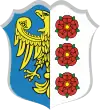Olesno
Olesno [ɔˈlɛsnɔ] (German: Rosenberg O.S.; Silesian: Uoleszno) is a town in Opole Voivodship, Poland about 42 kilometres (26 mi) north-east of the city of Opole. It is the capital of Olesno County and seat of the Gmina Olesno.
- For similarly named villages, see Olesno, Lesser Poland Voivodeship and Oleśno.
Olesno | |
|---|---|
.jpg.webp) Aerial view of Olesno | |
 Flag .svg.png.webp) Coat of arms | |
 Olesno  Olesno | |
| Coordinates: 50°52′30″N 18°25′0″E | |
| Country | |
| Voivodeship | |
| County | Olesno |
| Gmina | Olesno |
| First mentioned | 1226 |
| Town rights | 1275 |
| Government | |
| • Mayor | Sylwester Piotr Lewicki |
| Area | |
| • Total | 15.1 km2 (5.8 sq mi) |
| Elevation | 240 m (790 ft) |
| Population (2019-06-30[1]) | |
| • Total | 9,374 |
| • Density | 620/km2 (1,600/sq mi) |
| Time zone | UTC+1 (CET) |
| • Summer (DST) | UTC+2 (CEST) |
| Postal code | 46-300 |
| Car plates | OOL |
| Website | http://www.olesno.pl/ |
History

The area near the ancient Amber Road had been settled since the Neolithic era. Olesno was first mentioned in a 1226 deed by Bishop Wawrzyniec of Wrocław though it may refer to the neighbouring village of Stare Olesno (Old Olesno). It was part of the duchies of Opole, Silesia and again Opole of fragmented Piast-ruled Poland. In 1229 it was acquired by Duke Henry I the Bearded of Wrocław. Olesno became seat of a castellan and received town rights in 1275 from Duke Władysław Opolski.[2] A mint was also located in the town. It then was a part of the Duchy of Opole which became a fiefdom of the Kingdom of Bohemia in 1327 and was finally incorporated into the Holy Roman Empire by Charles IV in 1355, however, it remained under the rule of local Polish dukes within the Duchy of Opole until its dissolution in 1532.[2] The town suffered during the Thirty Years' War, and in 1645 it returned to Poland under the House of Vasa until 1666, when it fell again to Bohemia.[2]
In 1708 it was hit by a plague epidemic.[2] After the First Silesian War and the Treaty of Breslau (Wrocław) in 1742 Olesno was annexed by the Kingdom of Prussia, and in 1815 became part of the Province of Silesia. During the Napoleonic Wars, in 1806, the town was captured by French troops.[2] Despite Germanisation policies, in the 19th century the town was a significant Polish center in Upper Silesia, and from 1848 the first local Polish newspaper Telegraf Górnośląski was published.[2] After World War I, in 1919 and 1921, the Silesian Uprisings were fought there,[2] the aim of which was to reintegrate the town with Poland after it regained independence in 1918. In the Upper Silesia plebiscite of 20 March 1921 3,286 inhabitants voted to remain in Germany, 473 for Poland. Thus Rosenberg remained part of the Weimar Republic.[3] After the outbreak of World War II in 1939, the German authorities arrested local Polish activists.[4] On 21 January 1945 it was taken by the Soviet troops of the 5th Guards Army.
The Olesno Regional Museum was founded in 1960.[5]
Notable people
- Józef Lompa (1797–1863), Polish activist, poet and publisher
- Hermann Friedberg (1817–1884), physician
- David Rosin (1823–1894), theologian
- Reinhold Saltzwedel (1889–1917), U-boat commander
- Helmuth von Pannwitz (1898–1947), general
- Georg Burgfeld (1909–1957), highly decorated Hauptmann in the Wehrmacht
- Rudy Kennedy (1927–2008), rocket scientist
- Franciszek Kokot (born 1929), Polish nephrologist and endocrinologist
- Adam Ledwoń (1974–2008), football player
Twin towns – sister cities
Gallery
 Town hall at the Market Square
Town hall at the Market Square Corpus Christi church
Corpus Christi church.jpg.webp) Wooden Saint Anne church, built in 1518, expanded in 1668-1670
Wooden Saint Anne church, built in 1518, expanded in 1668-1670 Gothic Church of Saint Michael Archangel
Gothic Church of Saint Michael Archangel
References
- "Population. Size and structure and vital statistics in Poland by territorial divison in 2019. As of 30th June". stat.gov.pl. Statistics Poland. 2019-10-15. Retrieved 2020-02-14.
- "Rys historyczny". Urząd Miejski w Oleśnie (in Polish). Retrieved 13 February 2020.
- Ergebnisse der Volksabstimmung Archived 2015-09-24 at the Wayback Machine
- Andrzej Kurek, Niemieckie więzienia sądowe na Śląsku w czasach Trzeciej Rzeszy, Kraków, 2007, p. 143–144 (in Polish)
- "Oleskie placówki kultury". Urząd Miejski w Oleśnie (in Polish). Retrieved 13 February 2020.
External links
- Official town webpage
- German page about Olesno
- Jewish Community in Olesno on Virtual Shtetl

